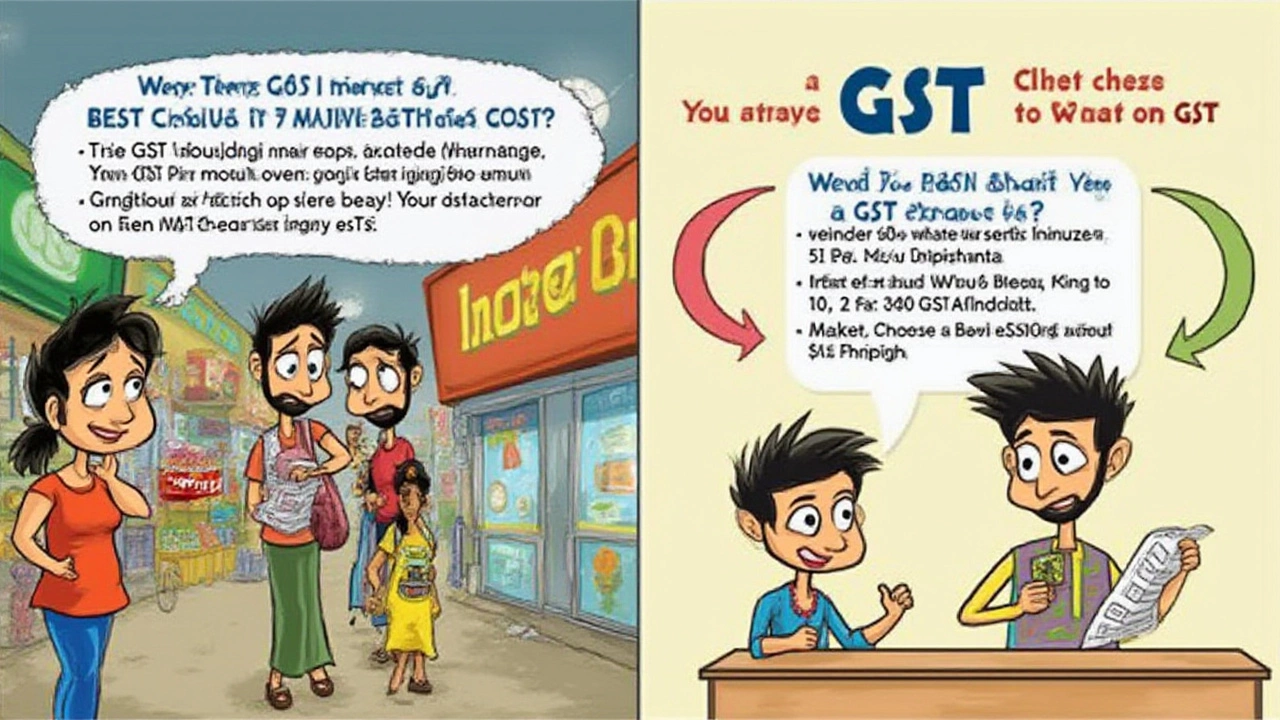 Jul, 14 2025
Jul, 14 2025
Picture this: you’re at an electronics store, wallet in hand, staring at the latest phone or TV. The clerk hands you a printed bill, and there it is—GST. It’s one of those taxes you notice, maybe grumble about, but then you hear from a friend, “Hey, can’t you just claim it back?” The answer isn’t what most people hope for. In India, GST (Goods and Services Tax) was created to avoid double taxation and to smooth out a tricky web of taxes for businesses. But can you really claim GST input tax credit (ITC) if you buy things for personal use?
How GST and Input Tax Credit Work in India
Let’s break down what happens every time you swipe your card and see GST on your bill. When you buy any product or service, you pay GST as the end consumer. That tax makes its way up the chain — from manufacturer to wholesaler to retailer—each adding a value and collecting GST along the way. Now, here’s the catch for businesses: the concept of Input Tax Credit (ITC). Imagine you own a furniture shop. You buy wood from a supplier and pay GST on that wood. Later, you sell a finished table and collect GST from your customer. You get to subtract the GST you already paid (on the wood) from the GST you collect (on the table), and only remit the difference to the government. Pretty clever, right?
But—and it’s a big one—the system is made for businesses, not for regular folks just shopping for themselves. Under Section 16 of the Central Goods and Services Tax (CGST) Act, 2017, ITC can be claimed only if you buy goods or services for use in your business or for further supply. If you’re buying something just for yourself or your family, ITC is off the table. The law is unusually clear here. Section 17(5) of the CGST Act has an explicit list of things you cannot claim ITC for, including personal consumption, motor vehicles (with a few rare exceptions), and goods given as gifts.
Let’s get specific. Say you run a bakery business. If you buy an oven for the bakery, GST paid on that oven is claimable as ITC. But if you buy an air conditioner for your house, however large, however expensive, GST is not eligible for ITC. If you try to be too clever and claim ITC on stuff that feeds your personal life, you could land in trouble. Penalties for wrong claims can be up to 100% of the wrongly claimed amount, plus interest, as per Section 122 of the CGST Act.
Here’s another common confusion: company parties, gifts to staff, or client entertainment. Businesses love to get creative, but the GST rulebook stands firm. Gifts above Rs. 50,000 to an employee in a financial year? No ITC. Expenses for parties or club memberships? Also ineligible. Only if the goods or services are directly used to run your business do you get the GST credit. The logic is simple — the government doesn’t want to subsidize your next vacation or fancy dinner under the business name.
These lines are well-guarded because GST authorities in India do scrutinize large claims or unusual business expenses. Today, with all bills uploaded real-time via GSTN (Goods and Services Tax Network), authorities can trace, match, and investigate claims. One red flag, and you risk audits or even prosecution.
So, forget about claiming GST on personal use. The law is strict, the punishments real, and the system smart enough to catch corner cutters. If it’s not a direct part of your business, just don’t try.

Where People Get it Wrong: Common GST Mistakes
GST is technical and, honestly, most people don’t read the rules line by line. That’s where myths creep in. The classic mistake is thinking, “If I have a GSTIN, I can claim it on anything.” Not true. The GST Identification Number (GSTIN) is only a license to operate and collect GST, not free rein to claim it back on anything you fancy buying.
Distance yourself from so-called "tax hacks" you find on forums. A real incident from April 2023: A Delhi resident tried to claim ITC on a high-end refrigerator bought for his home under his small business’s GST number. After a GST audit flagged the purchase as unrelated to business activity, he not only had to pay back the entire GST amount but also a hefty penalty. These things don’t fly under the radar in 2025, thanks to automated checks.
Another misconception: mixing business and personal expenses. Freelancers and self-employed pros often run personal purchases through their business, thinking nobody will notice. But the ITC tracking system compares purchases with declared business activity. Let’s say you run a software consultancy and suddenly claim GST on leather sofas or expensive watches—not exactly work essentials. Such mismatches are easy for the system to spot. Even split-use items—like a mobile phone partly used for work, partly for home—are tricky. The law only allows proportionate ITC, and you need proof. Not many people keep detailed logs, leading to claims getting denied.
Some retail shops even entice customers by saying, “Sir, want a GST bill? You can claim the tax.” What they don’t say is, unless you’re registered and buying for business, the bill is just for records. Individuals, non-business owners, and salaried employees can’t get that GST money back. It’s lost in the system, and that’s how GST is designed—end customers bear the tax, businesses don’t, simple as that.
Keep an eye on changes too. The government sometimes tweaks the rules—ITC claims for blocked categories, new compliance checks, tighter invoice matching. If you’re claiming GST credits, stay close to the latest notifications from GST Council (www.gstcouncil.gov.in), or risk surprises at your next tax filing.
| Eligible for GST ITC? | Example Purchase |
|---|---|
| Yes | Bakery buys flour for making bread |
| Yes | Consulting firm buys laptops for staff |
| No | Business owner buys 4K TV for home |
| No | Company gives personal gifts above Rs. 50,000 to employees |
| Partial | Mobile phone used 50% for business, 50% for personal (need usage records) |
If you’re unsure, just ask yourself: “Is this purchase wholly, exclusively, and directly used for my business?” If the answer’s iffy, best avoid claiming. It’s a simple litmus test that can spare you paperwork and future headaches.

Tips to Stay Compliant and Maximise Legit GST Benefits
Just because you can’t claim GST for personal expenses, doesn’t mean you can’t optimise your business savings. The real trick lies in smart planning, clean documentation, and sticking to the rules. Here’s how to do it like a pro:
- segregate personal and business expenses strictly. Keep two different cards, two sets of accounts. Don’t use your business GSTIN for family shopping—even if the shopkeeper encourages you.
- When you buy something partly for business, partly for home, keep usage logs. If you want to claim partial ITC (say, for a car used for both), record actual business miles or hours to calculate the proportion correctly. If you can’t prove it, GST officers will deny it.
- Always check the updated GST rulebook or consult your CA before claiming. Rules change each year—a perk claimed last year may become disallowed next.
- Match every ITC claim with valid business invoices uploaded to the GSTN portal. Fake or mismatched invoices will not just get rejected—you could end up blacklisted.
- For startups and small business owners: Invest in automated GST billing/accounting software (like Tally, Zoho Books, or ClearTax GST). These apps flag blocked ITC categories and help you avoid silly mistakes.
- If you’re gifting or entertaining employees, keep spends within the legal limits and record recipients to avoid violation of limit (gifts above Rs. 50,000 per employee per year).
- Register all suppliers and vendors on the GST portal. If your supplier doesn’t correctly file their GST return (GSTR-1 and GSTR-3B), you could lose your input tax credit because it won’t show up in your GSTR-2A auto-filled records.
- And if you get notices or queries from the GST office, respond on time—explain with documentation. Ignoring notices can trigger escalations, audits, or even prosecution under the CGST Act.
Here’s a fun fact: In 2023-24, GST audits in India flagged over Rs. 40,000 crore worth of false ITC claims. Most of these were not big scams—but business owners misunderstanding—or ignoring—the personal use rule.
To sum it up, GST is not a tool to save on personal shopping. Keep things business, stay within the law, and you avoid penalties. Need a GST perk? Invest in your business’s growth, and the input tax credit will reward you. For personal splurges, you’ve just got to factor in the tax and enjoy your purchase—no hidden rebates, no shortcuts.